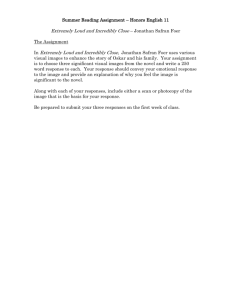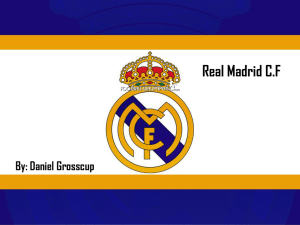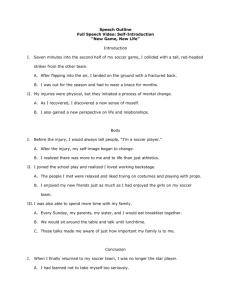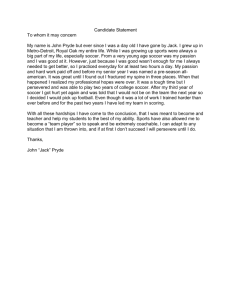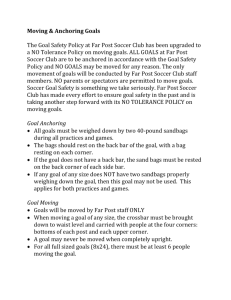English Paper Bertrand(2)
advertisement
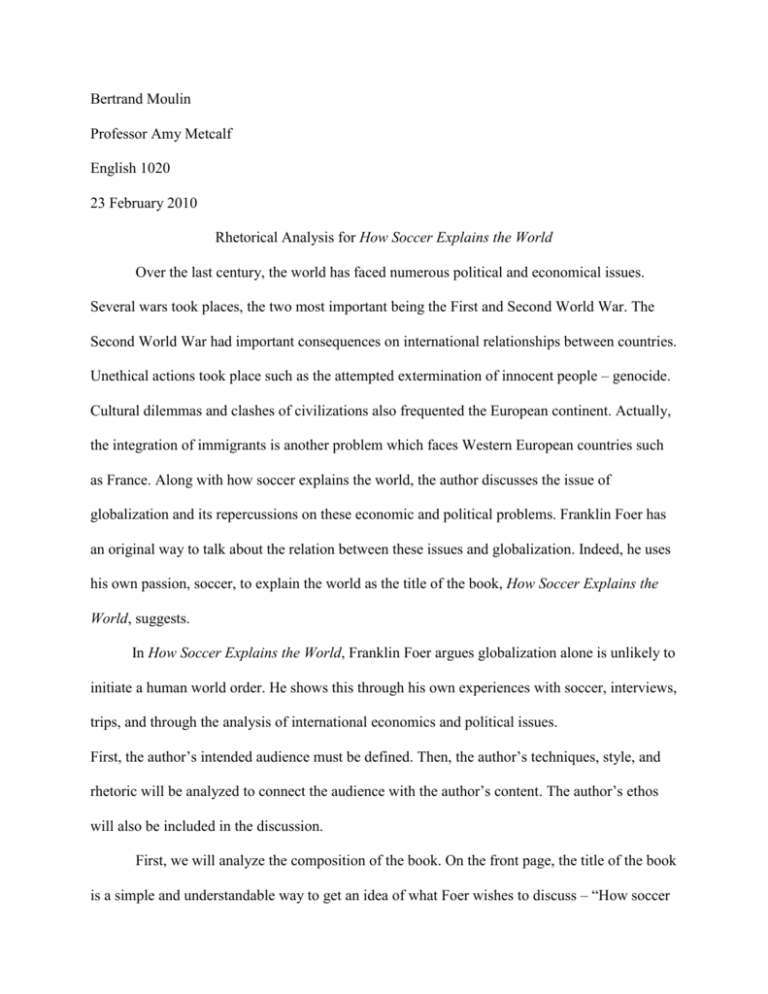
Bertrand Moulin Professor Amy Metcalf English 1020 23 February 2010 Rhetorical Analysis for How Soccer Explains the World Over the last century, the world has faced numerous political and economical issues. Several wars took places, the two most important being the First and Second World War. The Second World War had important consequences on international relationships between countries. Unethical actions took place such as the attempted extermination of innocent people – genocide. Cultural dilemmas and clashes of civilizations also frequented the European continent. Actually, the integration of immigrants is another problem which faces Western European countries such as France. Along with how soccer explains the world, the author discusses the issue of globalization and its repercussions on these economic and political problems. Franklin Foer has an original way to talk about the relation between these issues and globalization. Indeed, he uses his own passion, soccer, to explain the world as the title of the book, How Soccer Explains the World, suggests. In How Soccer Explains the World, Franklin Foer argues globalization alone is unlikely to initiate a human world order. He shows this through his own experiences with soccer, interviews, trips, and through the analysis of international economics and political issues. First, the author’s intended audience must be defined. Then, the author’s techniques, style, and rhetoric will be analyzed to connect the audience with the author’s content. The author’s ethos will also be included in the discussion. First, we will analyze the composition of the book. On the front page, the title of the book is a simple and understandable way to get an idea of what Foer wishes to discuss – “How soccer Moulin 2 explains the world an unlikely theory of globalization.” Foer declares that a human order is possible but globalization is not the solution to all this issues. International organizations are also important such as the United Nations, NATO, and the World Bank. The world needs organizations such as these to clarify and fix international political and economic issues. Later, Foer appeals to his own ethos in the prologue. He states that he was a journalist in Washington during the onset of early modern globalization and also a soccer fan – which makes him competent to talk about these subjects, which turn out to be interrelated. The main text is structured in ten independent chapters. The first part of the book explains the failure of globalization to eliminate hooliganism, regarding soccer. Foer posits that globalization has not eliminated local cultural identities or violent hatred among fans of rival teams, and it has not washed out local businesses in a sea of corporate wealth nor has it quelled rampant local corruption. In the second part of the book, globalization is seen in a more optimistic and economic sense – the consequences of migrations, corruption and the rise of powerful managers such as Berlusconi and Habramovitch. Then the third part is about the persistence of nationalism which coexists with globalization. However, there is no important relation between chapters in these parts. They are just ten chapters which are part of the Foer’s arguments, themes or events explained through soccer. The author could have regrouped the chapters together to make it flow more logically and more understandable. For example, the first chapter is named: “How Soccer Explains the Gangster Paradise.” This structure is simple and clear but it does not necessarily have a logical relation into it. Its structure makes it obvious for the audience that soccer is going to be what Foer uses to explain globalization and international relations. Indeed, the audience of the book remains obvious. The author wrote this book for people who enjoy soccer but also an audience who had knowledge on this subject. It makes the book Moulin 3 more interesting for the audience while also speaking about serious political and economic issues. However, since the book was published in United States, I believe the audience is not well chosen for the author. Indeed, the American population is not a fan of soccer and they are not considered an expert on this subject. For example, it would have more impact on Europeans who are much more accustomed to the sport. Because of this, more details are required to make the book understandable to Americans. Common ground regarding historical events in this book are the Second World War and the wars involved in the disintegration of Yugoslavia. These important and serious events are part of the rhetoric. Indeed, Franklin Foer uses different rhetorical tactics in his text. Throughout his argument, the most obvious tactic is the use of soccer as a medium to express his thoughts about serious issues. The audience is more attracted by the content and is going to be more aware of the situation through soccer which is supposedly a passion of the audience. For example, Foer makes this point through soccer in chapter 1: Arkan was a gangster and a Serbian leader during the war. He became the president of the soccer club of Obilic Belgrade. His club began winning the championship thanks to its president who threatened referees and players from other teams: “Arkan had threatened to shoot striker's kneecap if he scored against Obilic” (26). However, it is not possible to do it at a major scale. FIFA (the governing body of international soccer) does not tolerate this action and banned the club from the continental league. Here, FIFA is an example of an international organization which allows some regulation and a nominal amount of human order in the world. Foer uses his own experiences throughout the whole book. He took 6 months to travel around the world to broaden his experiences about soccer and politics in places such as South America, Europe and Africa. His trips are the basis for his main argument. For example, he talks Moulin 4 about his trip in Glasgow, Scotland and describes the antagonistic relationship between the two football clubs of the city: the “Glasgow rangers” who represent the Protestants and the “Celtics Glasgow” who represent the Catholics.” Throughout the book Foer tells uses anecdotes. These anecdotes stem from his own experience or from another person’s personal experience such as the case with Angus: “Angus began telling a story about traveling to Nottingham Forrest: it was just the two of us....”. Dialogues and interviews are also very useful to the author’s argument. In almost every chapter, the author interviews someone. It gives the audience another perspective regarding the situation. For example, Foer interviews two members of a hooligan gang of one of the Belgrade soccer clubs in the first chapter. Because of the interview, the situation can be viewed from inside of the gang and hooligan system which lends it more credibility. Foer often makes allusions to the Second World War and to the disintegration of Yugoslavia. The audience has at least some common knowledge regarding these two historical events, so it is possible for them to make the connections within the allusions. He also uses emotions, or pathos. For example, at the beginning of the book Foer uses nostalgia to recall the time when Eastern Europe football clubs used to dominate the European Champions League: “most glorious year in 1991, the team won the European championsip” (12). He also does a Eulogy for the Barcelona football club. It is his favorite team and he claims that it is more than a club. For him, the club is managed as a State and Foer cited one of the books written by Vaquez Montalban, a famous Spanish author called offside where he describes the “Barca” as “an epic weapon of a country without a State”. One part of the book is very interesting for a rhetorical analysis. In the first chapter the author talks about Arkan (Željko Ražnatović) who was a Serbian career criminal and later a paramilitary leader. He was also on Interpol's most wanted list and the owner of the football club Moulin 5 of Obilic. At first, I thought this description was not really important but then I realized that it has important rhetorical content. Arkan is presented as an anti-hero but also as a hero through the book – a paradox. Through corruption, and all the crimes he committed, he is an anti-hero and should be condemned. However, some people such as the Obilic football fans consider him as a hero who created and made Obilic one of the best clubs in Serbia. His story is also didactic because Foer links morals to their actions. Indeed, Arkan got killed by the secret police and Obilic might have been the proximate cause of his death. Foer concludes: “After he exploited soccer to destroy lives, soccer would destroy his own.” (28). He also gives a class analysis of the attractiveness of the sport to parents in the second part of the book. Franklin uses the invective type of sentence structure throughout his book to criticize Real Madrid. For example: “It makes me want to vomit” (p208). There are also some “bad words” through some testimonies such as Jimmy's about the Celtics: “they're fucking animals, they'd kill little children.” Finally, the tone of the text is neutral. We can tell that the author was a journalist. His style is quite similar to articles one would see in a newspaper. However, the fact and events he chooses in his book are negatives and are based on the failings of globalization. Because of this, the book is not realistic at certain points. However he makes it a little bit more real when he changes the tone in the final part of the book when his view on globalization is more positive. Foer’s overall strategy is compelling because he mixed its method of arguments with the relationship between a sport and political issues – this makes it more enjoyable. “Bad words” are also effective to show that hate and dislike are still prevalent in the author and with other people. I focused on this example in particular because I am a fan of soccer. I also think it is really interesting to relate sports to politics because politics also plays an influential, though subtle, role in sports. I think this approach of the situation is original. From my own experience, this is the Moulin 6 first book I have read that is able to convey ideas and explanations of modern issues through the lens of a sport, especially the most popular sport in the world. Moulin 7 Works Cited Foer, Franklin. How Soccer Explains the World: An Unlikely Theory of Globalization. 1st ed. New York: HarperCollins, NY. Print.


